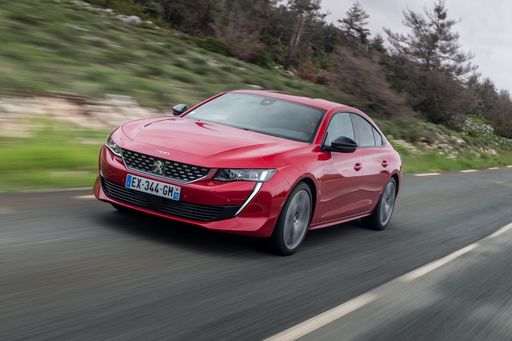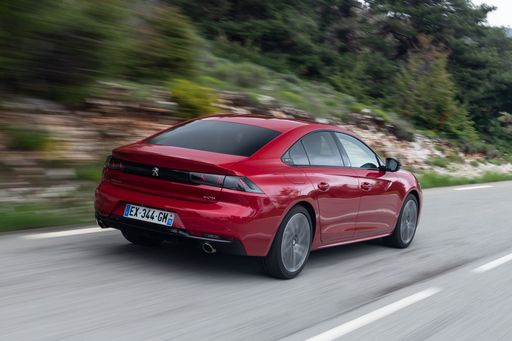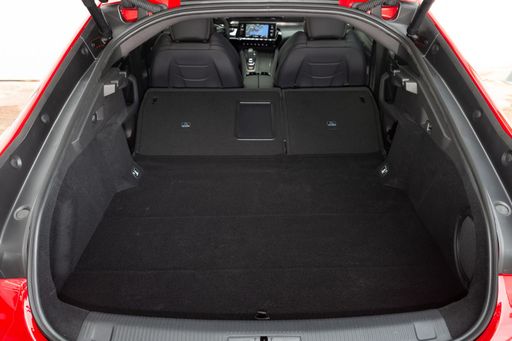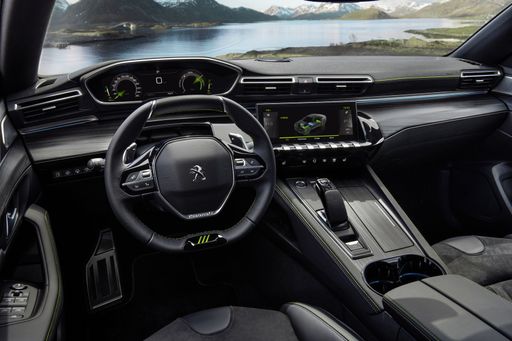Peugeot 508 vs Toyota Yaris – Differences & prices compared
Compare performance, boot space, consumption and price in one view.
Find out now: which car is the better choice for you – Peugeot 508 or Toyota Yaris?
The Peugeot 508 (Hatchback) comes with a Plugin Hybrid engine and Automatic transmission. In comparison, the Toyota Yaris (Hatchback) features a Full Hybrid or Petrol engine with Automatic or Manuel transmission.
When it comes to boot capacity, the Peugeot 508 offers 487 L, while the Toyota Yaris provides 286 L – depending on how much space you need. If you’re looking for more power, decide whether the 360 HP of the Peugeot 508 or the 280 HP of the Toyota Yaris suits your needs better.
In terms of consumption, the values are 1.60 L per 100 km for the Peugeot 508, and 3.80 L for the Toyota Yaris.
Price-wise, the Peugeot 508 starts at 44600 £, while the Toyota Yaris is available from 21900 £. Compare all the details and find out which model fits your lifestyle best!
Peugeot 508
The Peugeot 508 stands out with its sleek and sophisticated design, embodying a perfect blend of style and performance. Its cabin is a testament to modern engineering, offering a spacious and comfortable environment with high-quality materials throughout. As you glide down the road, the smooth handling and advanced technology make every journey a true pleasure, highlighting Peugeot's commitment to innovation and driver satisfaction.
details @ media.stellantis.com
@ media.stellantis.com
 @ media.stellantis.com
@ media.stellantis.com
 @ media.stellantis.com
@ media.stellantis.com
 @ media.stellantis.com
@ media.stellantis.com
Toyota Yaris
The Toyota Yaris exudes a charming blend of practicality and style, making it an appealing choice for urban drivers. Its compact design allows for easy manoeuvrability in crowded city streets, while the interior offers a surprisingly spacious and comfortable environment. With a focus on fuel efficiency and reliability, the Yaris remains a popular option for those seeking a balance between performance and economy.
details @ Toyota
@ Toyota
 @ Toyota
@ Toyota

|

|
|
|
|
Costs and Consumption |
|
|---|---|
|
Price
44600 - 60800 £
|
Price
21900 - 45000 £
|
|
Consumption L/100km
1.6 - 2 L
|
Consumption L/100km
3.8 - 9.5 L
|
|
Consumption kWh/100km
-
|
Consumption kWh/100km
-
|
|
Electric Range
46 - 55 km
|
Electric Range
-
|
|
Battery Capacity
-
|
Battery Capacity
-
|
|
co2
36 - 45 g/km
|
co2
87 - 215 g/km
|
|
Fuel tank capacity
43 L
|
Fuel tank capacity
36 - 50 L
|
Dimensions and Body |
|
|---|---|
|
Body Type
Hatchback
|
Body Type
Hatchback
|
|
Seats
5
|
Seats
4 - 5
|
|
Doors
5
|
Doors
3 - 5
|
|
Curb weight
1811 - 1941 kg
|
Curb weight
1090 - 1356 kg
|
|
Trunk capacity
487 L
|
Trunk capacity
141 - 286 L
|
|
Length
4750 mm
|
Length
3940 - 3995 mm
|
|
Width
1859 mm
|
Width
1745 - 1805 mm
|
|
Height
1403 mm
|
Height
1455 - 1500 mm
|
|
Payload
379 - 469 kg
|
Payload
289 - 525 kg
|
Engine and Performance |
|
|---|---|
|
Engine Type
Plugin Hybrid
|
Engine Type
Full Hybrid, Petrol
|
|
Transmission
Automatic
|
Transmission
Automatic, Manuel
|
|
Transmission Detail
Automatic Gearbox
|
Transmission Detail
Manual Gearbox, Automatic Gearbox, CVT
|
|
Drive Type
Front-Wheel Drive, All-Wheel Drive
|
Drive Type
Front-Wheel Drive, All-Wheel Drive
|
|
Power HP
180 - 360 HP
|
Power HP
116 - 280 HP
|
|
Acceleration 0-100km/h
5.2 - 8.2 s
|
Acceleration 0-100km/h
5.5 - 9.7 s
|
|
Max Speed
230 - 250 km/h
|
Max Speed
175 - 230 km/h
|
|
Torque
360 - 520 Nm
|
Torque
390 Nm
|
|
Number of Cylinders
4
|
Number of Cylinders
3
|
|
Power kW
133 - 265 kW
|
Power kW
85 - 206 kW
|
|
Engine capacity
1598 cm3
|
Engine capacity
1490 - 1618 cm3
|
General |
|
|---|---|
|
Model Year
2024
|
Model Year
2024 - 2025
|
|
CO2 Efficiency Class
B
|
CO2 Efficiency Class
B, G
|
|
Brand
Peugeot
|
Brand
Toyota
|
Peugeot 508
Unleashing the Elegance: An Introduction to the Peugeot 508
The Peugeot 508 is a testament to the fusion of elegance and innovation, setting new benchmarks for mid-size saloons in the competitive automotive market. This remarkable vehicle from the French marque, Peugeot, offers an exceptional blend of modern design, hybrid efficiency, and dynamic performance.
Power and Efficiency: Examining the Peugeot 508's Plug-in Hybrid Technology
At the heart of the Peugeot 508's appeal lies its advanced plug-in hybrid technology. Customers can choose from a range of power outputs, with options delivering between 180 PS and an imposing 360 PS. Remarkably, this hybrid system allows for an impressive fuel consumption rate ranging from 1.3 to 2 L/100km, coupled with an electric range of up to 55 km. This efficiency does not come at the expense of performance, with the vehicle capable of accelerating from 0 to 100 km/h in just 5.2 to 8.2 seconds, depending on the variant.
Dynamic Design: The Aesthetic Allure of the Peugeot 508
The Peugeot 508 stands out with its distinctive fastback silhouette, epitomising the term “Schrägheck”. Its sleek lines and aerodynamic profile give it a striking presence on the road, while the spacious interior provides comfort for up to five passengers. With an overall length of 4750 mm, a width of 1859 mm, and a height of 1403 mm, the 508 is designed to be both stylish and practical.
Technological Innovations: Advanced Features of the 508
The 508 does not disappoint when it comes to cutting-edge technology. Equipped with an advanced automatic transmission, the driving experience is smooth and responsive. The model also boasts innovative safety and connectivity features, contributing to both driver and passenger comfort and security.
Performance and Precision: Handling and Dynamics
Thanks to its high torque, ranging from 360 Nm to 520 Nm, the Peugeot 508 offers excellent handling and driving dynamics. The availability of both front-wheel and all-wheel drive options ensures that the vehicle can perform in various driving conditions, providing an assurance of safety and stability.
Conclusion: The Peugeot 508 as a Modern Marvel
With a price range of €52,000 to €70,900, the Peugeot 508 offers a competitive edge in its class, providing luxury, innovation, and efficiency. Its combination of cutting-edge hybrid technology, style, and performance makes it a compelling choice for those who seek sophistication and sustainability in a modern vehicle.
Toyota Yaris
Introducing the Next-Gen Toyota Yaris: A Blend of Innovation and Technology
The Toyota Yaris has long been lauded for its efficiency, reliability, and practicality. As we venture into the 2024 model year, Toyota has upped the ante with the latest versions of this popular hatchback, melding cutting-edge technology with eco-conscious design. Here’s an in-depth look at what makes the current Yaris line-up stand out from the crowd.
Efficient Powertrains: Hybrid and Beyond
Spearheading the technological innovation in the Yaris range is the introduction of various hybrid models. The Yaris offers a 1.5-litre full-hybrid engine, marrying a petrol engine with an electric motor to produce between 116 and 130 PS. This power blend is controlled via a sophisticated CVT-gearbox, optimizing both performance and fuel efficiency, with consumption figures ranging from an impressive 3.8 to 4.2 litres per 100 km.
For those seeking pure performance, the GR Yaris variants provide a turbocharged 1.6-litre engine capable of producing 280 PS. This power is delivered via a choice of manual or automatic transmission, giving drivers the tactile involvement or convenience they desire.
Design that Fulfils and Inspires
The Yaris hasn't forgotten its roots as a compact, city-friendly hatchback, measuring between 3,940 and 3,995 mm in length. With its bold front grille, sleek lines, and a choice of striking colours, it's a car that turns heads while remaining perfectly suited for urban environments.
The interior is equally impressive, designed with a focus on driver convenience and comfort. Depending on the variant, Yaris can offer generous cargo space of up to 286 litres, making it a perfect companion for everyday tasks or weekend escapes.
Technological Integration: The Smart Choice
Toyota's approach goes beyond just improving engine technology; the Yaris is packed with innovative features aimed at enhancing the driving experience. It boasts a suite of advanced safety systems such as lane departure alert, pre-collision system, and adaptive cruise control, ensuring peace of mind on the road.
The infotainment system in the Yaris is designed to keep you connected, offering seamless smartphone integration, a user-friendly interface, and an intuitive navigation system, ensuring that you're always informed and entertained.
The Cost of Innovation
Owning a Yaris is not just about impressive technology; it's also about making economic sense. With a price range between €25,500 and €49,990, and monthly costs spanning from €748 to €1,513, it offers a broad spectrum to suit different budget needs.
Concerned about emissions? You can rest easy knowing that the Yaris boasts a CO2 efficiency class ranging from B to G, thanks to its low emissions output of between 87 to 215 g/km.
Conclusion: The Toyota Yaris Drives the Future
The Toyota Yaris continues to be a strong contender in the compact car segment, pushing boundaries with its innovative full-hybrid systems and performance-oriented GR models. It's a remarkable blend of design, technology, and economy, ensuring it remains a top choice for drivers who demand more from their hatchbacks.
Whether you're seeking the efficiency of a hybrid or the thrill of the GR Yaris, there's a model tailored to your unique driving needs in Toyota's latest Yaris lineup.
Which drive types are available for the Peugeot 508?
Available as Front-Wheel Drive or All-Wheel Drive.
The prices and data displayed are estimates based on German list prices and may vary by country. This information is not legally binding.
